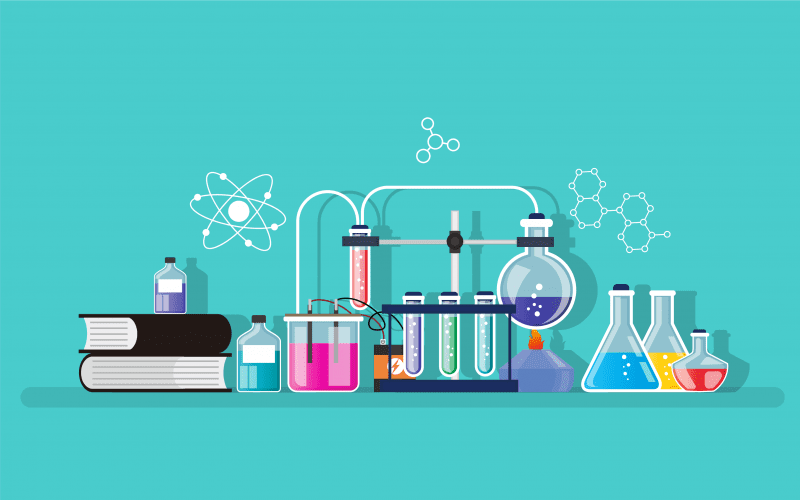Chemistry is one of the most important subjects in the field of Science. It deals with the study of substances which are composed of matter and investigates the chemical properties and reactions in order to form new substances or understand the behaviour of the existing ones. In order to crack government exams after 12th Science or after graduation like the JEE Advanced, CSIR NET, and IIT JAM, Chemistry is an unavoidable subject. With a wide range of topics from Organic, Inorganic and Physical Chemistry, it is important to have a strong foundation of the basic chemistry concepts. So, to make things easier, we have collated lesson-wise, important terms which you should be aware of in order to score well in any examination. Without further ado, let’s start!
Matter and its Nature
| Concepts | Explanation |
| Matter | It is any substance that has mass and occupied space. It can be in any form – solid, liquid and gas. |
| Boiling Point | It is the temperature of any substance where the liquid’s vapour pressure is equivalent under an external pressure of one atmosphere thus converting liquid to gas. |
| Freezing Point | It is the temperature at which liquid converts into a solid under normal atmospheric pressure. |
| Surface Tension | It is a basic chemistry concept which talks about the elastic tendency of a fluid surface which makes it acquire the least surface area possible. Here, the molecules are attached very closely. |
| Diffusion | It is the process of movement of any substance from a region of higher concentration to the lower one. |
| Evaporation | It is a process where a liquid is converted into a gaseous state. |
| Decantation | It is a process in which separate mixtures are removed by eradicating the liquid layer which is free to precipitate or solids which are being deposited out from a solution. |
| Viscosity | When a liquid is of thick, sticky, and semi-fluid consistency due to internal friction, it’s called Viscosity. |
Here is what you need to know about the Chemistry syllabus for class 12th!
Basic Chemistry Concepts Related to Periodic Classification of Elements
| Concepts | Explanation |
| What is a Metal in a Periodic Table? | It is a material which is hard in nature, is opaque, shiny and also has good electrical and thermal conductivity. |
| What are Non- Metals? | This type of chemical element is highly volatile in nature with low elasticity and poor heat conductivity. good heat conductivity. |
| What are Metalloids? | Elements that have properties between those of metals and nonmetals. |
| Which is the lightest element in the universe? | Hydrogen |
| Which is the most malleable element? | Gold |
| An element which is the best conductor of electricity | Silver |
| Which is the highest electro-negative element? | Fluorine |
| Which is the only liquid metallic element? | Mercury |
Acids Bases And Salts
| Concepts | Explanation |
| What is Acid? | It is the substance that has some chemical properties like turning litmus red, neutralizing alkalis, and dissolving some metals; typically, a corrosive or sour-tasting liquid of this kind. It can be understood as an ion that has the tenancy to bond with an electron pair. Acid is a proton donor. |
| What is a Base? | Bases are compounds which are proton acceptors in nature. They are of an aqueous solution, slippery in nature tastes astringent and react with acids to form salts. |
| What is Arrhenius Concept? | Arrhenius are those substances which produce ions based on H+. They are acids when dissolved in water and generates OH- ions in water.The formula is:
HA → H+ + A– (Acid) |
| Hydrolyzable | It is a substance which is capable of dissociating in water |
| Lewis Theory | It talks about how an acid substance accepts a lone pair of electrons. And how base donates a lone pair of electrons. |
| Strong Acid | This type of acid has a tendency to get dissolved in water. |
| Weak acid | This type of acid disassociates partially at the time of dissolving in water. |
| Strong Base | It has a tendency to dissociate completely in water. |
| Weak Base | This type of base can dissociate partially when in water. |
Basic Chemistry Concepts on Important Ores
| The main ore of Iron | Hematite |
| Main ore of Aluminium | Bauxite |
| The main ore of Copper | Chalcopyrite |
| The main ore of Zinc | Sphalerite |
| Important ore of Lead | Galena |
| Main ore of Mercury | Cinnabar |
| Main source of Sodium | Rock Salt |
| Main ore of Tin | Cassiterite |
| Magnesium Ore | Dolomite |
| The main ore of Phosphorous | Fluorapatite |
Though not restricted to this, these were some of the important basic Chemistry concepts which one must have a stronghold on. Do you want to explore options in this field?
Not sure about which course to pursue?
Don’t worry! Reach out to our experts at Leverage Edu who will help you choose a course that matches your skills and will also help you proceed with the application process!
-
I realy like your notes

 One app for all your study abroad needs
One app for all your study abroad needs





















 45,000+ students trusted us with their dreams. Take the first step today!
45,000+ students trusted us with their dreams. Take the first step today!



1 comment
I realy like your notes